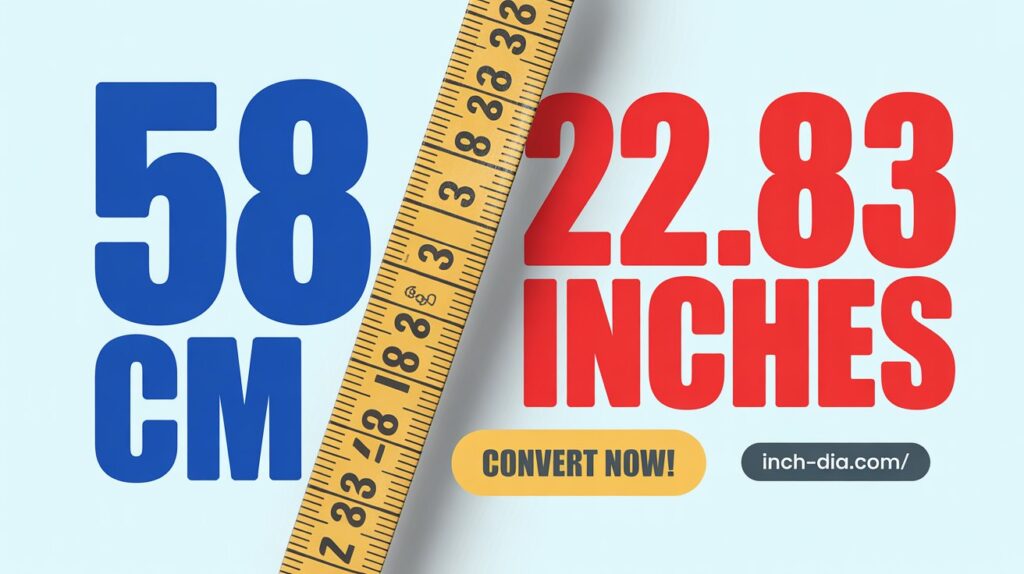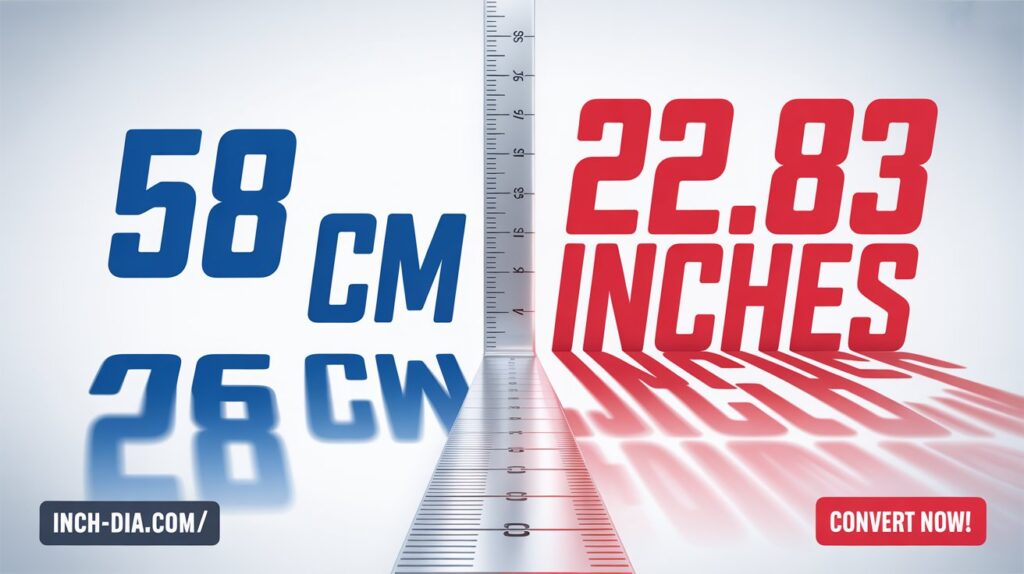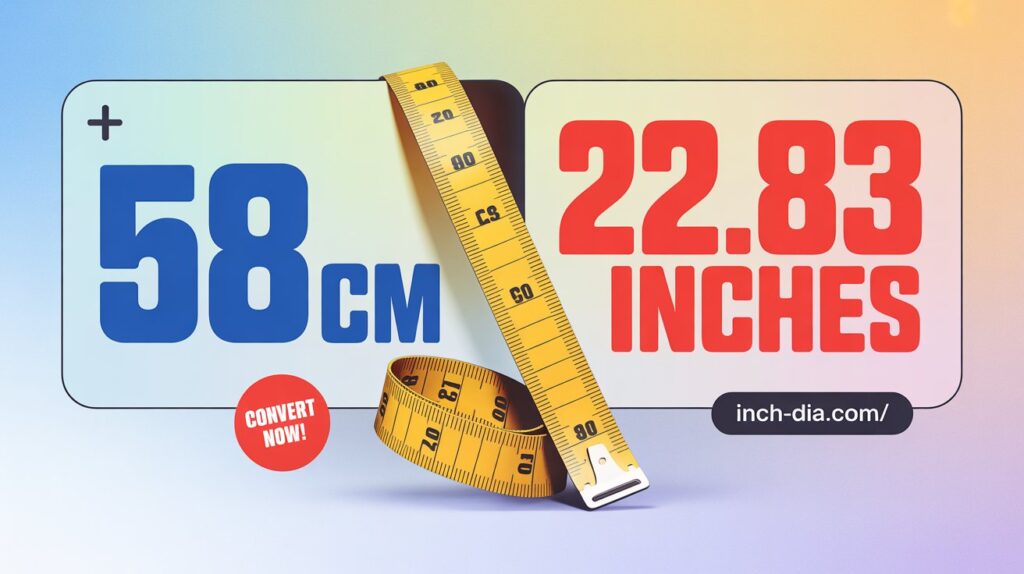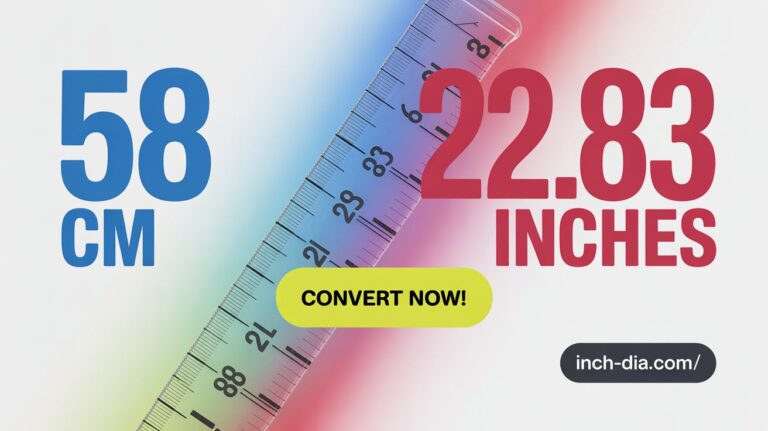Whether tackling a DIY project, shopping for international products, or simply curious about measurements, knowing how to convert 58 cm to inches is a valuable skill.
This comprehensive guide will walk you through the 58 cm to inches conversion process, offering step-by-step instructions, practical tips, and tools to make the process seamless.
By the end, you’ll be confident in how to convert centimeters to inches and apply this knowledge in real-world scenarios. Let’s dive into the world of measurements and make the metric-to-imperial conversion as easy as pie.
Introduction to Measurement Conversion
Measurement conversions are a part of everyday life, especially in a globalized world where different countries use different systems.
The metric system, which includes centimeters, is standard in most countries, while the imperial system, which uses inches, is common in places like the United States.
Knowing how to change centimeters to inches is essential for tasks like crafting, shopping, or even academic projects.

Why Understanding Centimeters to Inches Conversion Matters
Converting measurements ensures accuracy when working across systems. For instance, if you’re buying a 58 cm-long item from a European website but need to know its size in inches for a US-based project, you’ll need to perform a 58 cm to inches conversion.
This skill saves time, prevents errors, and ensures compatibility in various scenarios, from home improvement to international travel.
The Importance of Converting 58 cm to Inches
Why focus on 58 centimeters in inches? This specific measurement often appears in practical contexts, such as the length of a small table, the width of fabric, or the size of a suitcase.
By learning to convert 58 cm to inches, you’re equipping yourself to handle similar measurements with ease, making your projects and purchases more efficient.
Understanding Centimeters and Inches
Before we jump into the math, let’s clarify what centimeters and inches are and why they matter.
What Are Centimeters and Inches?
A centimeter (cm) is a unit of length in the metric system, equal to one-hundredth of a meter. It’s widely used globally for precise measurements in science, engineering, and daily life.
An inch (in), on the other hand, is part of the imperial system and is commonly used in the US, UK, and a few other countries. One inch equals 2.54 centimeters, which is the key to our centimeters-to-inches formula.
The Role of Metric to Imperial Conversion in Daily Life
Metric to imperial conversion bridges the gap between two systems, allowing seamless communication and compatibility.
For example, if you’re ordering a 58 cm item from a metric-based country but need to ensure it fits a space measured in inches, you’ll need to convert metric to inches. This is especially common in industries like fashion, construction, and travel.
The Centimeters to Inches Formula Explained
The heart of how to convert centimeters to inches lies in a simple formula. Let’s break it down.
How to Convert 58 cm to Inches Manually
To transform 58 cm to inches, you multiply the centimeter value by the conversion factor, 0.393701. The formula is:
Inches = Centimeters × 0.393701
For 58 cm into inches:
- 58 × 0.393701 = 22.834658 inches.
- Rounded to two decimal places, 58 cm equals how many inches? Approximately 22.83 inches.
This calculation is precise and works for any centimeter-to-inch conversion.
Step-by-Step Process to Change Centimeters to Inches
Here’s a clear, step-by-step guide to convert 58 cm to inches:
- Start with the measurement: You have 58 cm.
- Use the conversion factor: Multiply by 0.393701.
- Calculate: 58 × 0.393701 = 22.834658 inches.
- Round for practicality: Use 22.83 inches for most applications.
This method ensures accuracy and is easy to replicate for other measurements.
Example: Calculating 58 Centimeters in Inches
Imagine you’re buying a 58 cm piece of fabric for a sewing project, but the pattern uses inches. Here’s how you’d do it:
- Take 58 cm.
- Multiply by 0.393701: 58 × 0.393701 = 22.834658 inches.
- Round to 22.83 inches.
Now you know the fabric is 22.83 inches long, ready for your project.

Tools to Simplify 58 cm to Inches Conversion
If manual calculations aren’t your style, there are plenty of tools to make 58 cm to inches conversion quick and easy.
Using a centimeter-to-inch calculator
Online centimeter-to-inch calculators are a fantastic resource. Websites like metric-conversions.org, rapidtables.com, or even Google’s built-in converter allow you to input 58 cm and instantly get 22.83 inches.
These tools are perfect for those who want to convert cm to inches online without doing the math.
Best Apps for Convert cm to Inches Online
For on-the-go conversions, apps like Unit Converter, ConvertPad, or All-in-One Calculator are lifesavers.
These apps let you input 58 cm to inches and get instant results, often with additional features like saving recent conversions or switching between units like feet or meters. They’re ideal for easy cm to inches conversion during shopping or travel.
Manual Tools for How to Measure 58 cm in Inches
If you prefer hands-on methods, a ruler or measuring tape with both centimeter and inch markings can help.
Measure 58 cm, then check the corresponding inch mark. While less precise than a calculator, this method is useful for quick estimates in centimeters to inches for DIY projects.
Practical Applications of 58 cm into Inches
Converting 58 cm to inches has countless real-world uses. Let’s explore some common scenarios.
Centimeters to Inches for DIY Projects
DIY enthusiasts often face measurement challenges when plans use inches but tools or materials are in centimeters.
For example, if you’re building a shelf and the wood is 58 cm long, converting it to 22.83 inches ensures it fits your design.
Accurate conversions prevent costly mistakes in metric to imperial conversion for woodworking, sewing, or home decor.
Shopping and 58 cm Conversion to Imperial Units
When shopping online, especially from international retailers, product dimensions might be listed in centimeters.
If you’re in a country that uses inches, converting 58 cm to inches helps you visualize the size. For instance, a 58 cm suitcase might be advertised, but knowing it’s 22.83 inches helps you check if it meets airline restrictions.
Other Real-World Uses for Convert Metric to Inches
Beyond DIY and shopping, 58 cm to inches conversion is useful in:
- Fitness: Measuring a 58 cm waist for clothing or equipment sizing.
- Education: Solving math or science problems involving unit conversions.
- Travel: Understanding dimensions for luggage, souvenirs, or rental equipment.
These applications make converting 58 cm to inches a practical skill for everyday life.
Tips for Accurate Measurement Conversion Guide
To ensure your conversions are spot-on, follow these practical measurement conversion tips.
Avoiding Mistakes When You Transform 58 cm to Inches
Common errors can throw off your results. Here’s how to avoid them:
- Use the exact conversion factor: Stick to 0.393701, not approximations like 0.4, which can lead to inaccuracies.
- Double-check calculations: A small multiplication error can skew your result.
- Round appropriately: For most purposes, rounding 58 cm equals how many inches to 22.83 inches is sufficient, but technical projects may require more precision.
How to Verify Your 58 cm Equals How Many Inches.
To confirm your conversion:
- Use an online centimeter-to-inch calculator to cross-check.
- Measure with a dual-unit ruler to visually verify 58 cm against inches.
- Repeat the calculation to ensure consistency.
These steps ensure your 58 cm to inches conversion is accurate every time.
Advanced Conversion Techniques
For those who need more than basic conversions, let’s explore advanced methods.
Converting 58 cm to Inches for Technical Projects
In fields like engineering or architecture, precision is critical. When converting 58 cm to inches for technical drawings, avoid rounding until the final step.
Use the full value (22.834658 inches) for calculations, then round to the required decimal places based on project specifications.
Batch Conversions for Multiple Measurements
If you’re working with multiple measurements (e.g., 58 cm, 100 cm, 25 cm), you can streamline the process:
- Create a spreadsheet with the formula: =A1*0.393701, where A1 is the centimeter value.
- Input all measurements and get instant inch equivalents.
- This is especially useful for centimeters to inches for DIY projects involving multiple components.

Frequently Asked Questions
Let’s address some common questions to clarify how to convert centimeters to inches.
What Is the Exact Value of 58 cm in Inches?
Using the formula, 58 cm equals how many inches? Exactly 22.834658 inches, or approximately 22.83 inches when rounded.
Can I Use a Ruler for Easy cm to Inches Conversion?
Yes, a ruler with both cm and inch markings can help you estimate 58 cm into inches. Measure 58 cm, then check the inch side. However, this method is less precise than calculating or using a centimeter-to-inch calculator.
What Other Units Can I Convert 58 cm Into?
Besides inches, you can convert 58 cm to:
- Feet: 58 ÷ 30.48 ≈ 1.9 feet.
- Meters: 58 ÷ 100 = 0.58 meters.
- Millimeters: 58 × 10 = 580 mm.
- Yards: 58 ÷ 91.44 ≈ 0.63 yards.
These conversions expand your options for metric to imperial conversion.
Why Is Metric to Imperial Conversion Confusing?
The confusion often stems from different systems using different base units. The metric system is decimal-based, while the imperial system uses fractions and varied units (inches, feet, yards). Understanding the centimeters to inches formula simplifies the process.
Conclusion
Learning to convert 58 cm to inches is a practical skill that saves time and prevents errors in countless scenarios.
Whether you’re using the centimeters-to-inches formula (58 × 0.393701 = 22.83 inches), a centimeter-to-inch calculator, or a dual-unit ruler, this guide equips you with everything you need.
From centimeters to inches for DIY projects to shopping and travel, you’re now ready to handle 58 cm to inches conversion with confidence.
Keep this measurement conversion guide handy, and you’ll never be stumped by metric-to-imperial conversions again.

